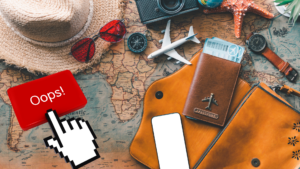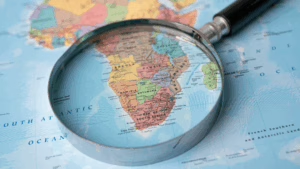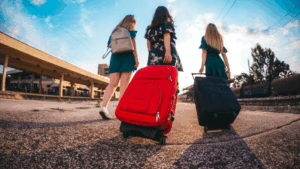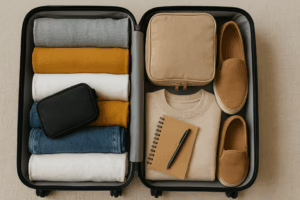Confirm All Travel Documents and Logistics
First, we recommend you review and confirm your itinerary. Read your travel documents and plans as they are the foundation of any successful trip. Ensure that you have all the documentation needed and that you confirm local departure dates, times, and locations. I will never forget one time, I was picking up a family member, and because I was so stressed, I drove to the wrong airport location! Since then, I triple check all the details to make sure this never happens again..
For international travel, check your passport’s expiration date. Many countries require at least six months’ validity beyond your return date. Passport renewals can take time, and expediting services, while faster, still take time and cost more. Years ago, I had to expedite my passport; it required driving an hour away, finding parking, and waiting for hours until they called my name! Visas, too, can be challenging.. Some, like those for China or Russia, require a detailed application process, including letters of invitation or proof of financial means.
Even for domestic travel, it is worth double-checking your flight times, accommodation reservations, and ground transportation. In this day and age, many people use travel apps which store their travel information so they have access at a moment’s notice. We still recommend printing out confirmations for your reference.
Travel insurance is another essential often overlooked. Policies can cover trip cancellation, medical emergencies, and lost luggage. According to data from Squaremouth, a travel insurance comparison engine, the most common claim in 2023 was for trip cancellation, not medical issues. That suggests planning disruptions are far more likely than dramatic accidents abroad.
Notify Financial Institutions and Secure Currency
Nothing derails a trip faster than a frozen bank card. Banks and credit card companies are quick to flag suspicious activity, especially when transactions suddenly appear in another country. Call your providers or use their apps to set travel alerts. While many major banks now use real-time fraud detection that adapts to patterns, alerts still serve as an extra layer of security.
If you are traveling internationally, decide how you will handle currency. While some travelers rely entirely on cards, cash is still king in many places. Markets, taxis, and small restaurants often prefer or require cash. Exchange a modest amount before you leave to avoid airport rates, which are notoriously high.
Some travelers swear by multi-currency cards or travel debit accounts, such as those offered by Revolut or Wise. These options allow you to convert money in advance, lock in favorable rates, and avoid foreign transaction fees.
Manage Your Home Like You Will Not Be Back for a Month
One of the biggest oversights travelers make is underestimating what their home needs while they are gone. Even if you are leaving for a few days, treating your house like you are away for a month ensures you are covering all possibilities.
Start with security. If you do not have a smart home system, consider setting timers on lights or asking a trusted neighbor to stop by. Hold your mail through USPS or ask someone to collect it. Piled-up packages or newspapers are beacons for would-be thieves.
Appliance maintenance is another step travelers often forget. Empty the fridge of anything perishable. Take out the trash, clean the garbage disposal, and run a bit of vinegar through the dishwasher. These small actions prevent unpleasant odors—or worse—on your return.
If you live in an area prone to storms or cold snaps, think about your pipes, roof, and garden. Turn off the water if necessary, check sump pumps, and secure outdoor furniture. Smart thermostats, like Google Nest, allow you to monitor and adjust temperatures remotely.
Protect Your Digital Life and Devices
In an age where nearly everything is online, your digital life deserves as much preparation as your physical one. Back up your devices, especially your phone, before you go. Photos, documents, and messages can be lost forever if a device is stolen or breaks while you are traveling.
Consider using a password manager to store your credentials securely. Services like 1Password or Bitwarden allow access from anywhere, which is essential if you need to log into banking apps or cloud storage from another device.
Public Wi-Fi networks, often used in hotels and airports, can be a security risk. A virtual private network (VPN) encrypts your connection and protects sensitive information. Some experts recommend avoiding financial transactions over public networks altogether, even with a VPN, just to be safe.
Lastly, bring the right chargers, adapters, and a portable battery. Different regions use different voltage standards and plug types. A universal adapter and voltage converter may be needed to protect your electronics from damage.
Arrange for Work and Life to Continue Without You
Whether you are taking a vacation or a business trip, stepping away requires delegation and communication. Tie up loose ends before you go, and let colleagues or clients know when you will be unavailable. Set an out-of-office auto-response with alternative contacts in case of emergencies.
If you manage a team, hand off tasks with clear instructions and documentation. Leave room for questions before you depart. Trust and preparation go a long way toward reducing messages that start with “Where is the file?” or “What do we do if…?”
Do not forget your personal responsibilities. If you are a caregiver, arrange for someone to check on aging parents or pets. If you have children, ensure schools know who is authorized to pick them up. Small details like prescription refills, bill payments, and appointment rescheduling can pile up quickly if overlooked.
These are not simply errands; they are the infrastructure of your daily life. Preparing them in advance means you are truly free to enjoy your time away.
Pack with Intention and Contingency
Packing is one of the most visible parts of travel prep, but it is also the most psychological. What you bring reflects what you expect—and what you hope to avoid. Smart packing is about predicting needs and controlling for the unexpected.
Start by checking the weather not only for your destination, but also for the time of day you will be arriving. A red-eye flight that lands in a chilly city at dawn can be miserable without layers on hand. Similarly, an umbrella is one of the easiest items to forget—and one of the most appreciated when you need it.
Build your suitcase with three types of scenarios in mind: planned events, daily life, and emergencies. The first includes weddings, meetings, or outings with specific dress codes. The second includes comfortable clothes, toiletries, and everyday shoes. The last includes a basic first aid kit, copies of your IDs, and any medications.
Experienced travelers recommend packing a change of clothes and a toothbrush in your carry-on, especially for long flights. Delayed or lost luggage can happen even on the most reliable airlines. In 2023, the Department of Transportation recorded over 300,000 mishandled bags in the U.S. alone.
Prepare for the Psychological Shift of Leaving
Travel is not just a change in scenery—it is a change in mindset. Preparing mentally can help ease the transition and reduce the stress that often comes with sudden disconnection from the familiar.
In the days before you leave, scale down your commitments. Avoid cramming errands or social obligations into your final hours. Give yourself time to breathe, reflect, and move slowly. Some travelers find it helpful to write down any lingering worries or to-do items, just to get them out of their head before stepping on a plane.
If you are traveling with others, have a conversation about expectations. What does everyone hope to get out of the trip? What are the non-negotiables, and where is there room for spontaneity? Having this clarity upfront can prevent misunderstandings and enhance the experience for everyone involved.
Most importantly, allow yourself to get excited. Travel is a privilege, and even when it is stressful, it is also a chance to reset your perspective. In a world of constant digital noise, disappearing for a while can be its own kind of luxury.
TLDR: Pre-Travel Checklist Summary
- Check passport and visa requirements; renew documents if needed
- Confirm flights, accommodations, and transportation; save all records digitally
- Purchase travel insurance for cancellations or medical emergencies
- Notify your bank and credit card companies about your travel plans
- Get local currency or travel-friendly debit cards to avoid poor exchange rates
- Set timers, clean out the fridge, and ask a neighbor to check on your home
- Back up your devices and use a VPN to protect personal data
- Pack smartly with essentials, backups, and contingency gear
- Set up out-of-office notifications and delegate key tasks at work
- Schedule any pet, child, or elder care ahead of time
- Give yourself mental space to wind down before leaving
- Talk through trip expectations with travel companions
Preparing well is not about paranoia. It is about creating space. Space to enjoy, to explore, and to return with memories instead of regrets. Whether your next trip is a week or a month, this checklist is your guide to stepping away with confidence.















